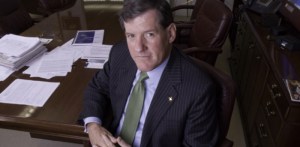As Lieber Leaves Bloomberg for Farkas, a Look Back at Development Record
By Eliot Brown May 19, 2010 4:13 pm
reprints Bob Lieber is moving on.
Bob Lieber is moving on.
The deputy mayor for economic development since 2008, Mr. Lieber today announced he would be leaving the Bloomberg administration to work with real estate investor and former Andrew Cuomo employer Andrew Farkas, founder of one-time powerhouse firm Insignia (which later became CB Richard Ellis) and a person who had worked with Mr. Lieber in the past.
This makes him the third deputy mayor to depart in the past three months, an exodus that invites a major change in the voices surrounding the mayor. (Ed Skyler announced his departure for Citigroup in March, as did Kevin Sheekey with his move to Bloomberg LP.)
A former real estate banker at Lehman Brothers, Mr. Lieber was brought in to city government in 2007 after he helped the Bloomberg administration with an analysis on the World Trade Center, assisting city officials with their plan to restructure a financial deal at the site. He was given the post of president of the Economic Development Corporation, working a year in that job before being appointed successor to Deputy Mayor Dan Doctoroff, who left to run Bloomberg LP.
His charge was to implement the long list of projects that Mr. Doctoroff and his staff had dreamed up, with the expectation of a two-year commitment, since the mayor had yet to overhaul term limits.
Within the real estate field, comparisons still abound between Mr. Lieber and Mr. Doctoroff, the lead booster for the Olympic bid who had grand dreams for economic development and planning, and a hard-driving driving style that often drew detractors. To be certain, Mr. Lieber did not assume the high-profile character of Mr. Doctoroff, and was known for a more relaxed and less aggressive style when dealing with elected officials or neighborhood groups—an approach that elected officials generally seemed to appreciate. And in the end, he did get major development plans through the City Council, such as Coney Island and Willets Point in Queens (the exception was the Kingsbridge Armory in the Bronx, for which the administration suffered a defeat when living wage came to dominate the issue).
THE FREQUENT COMPLAINTS about Mr. Lieber, including from some on his staff, was that he lacked vision, sticking to what was already on the agenda and not pushing the envelope to deviate from it. Still, he was handed a plate of projects that was probably far more than any administration could realistically take on at once, particularly as budgets shrunk and complexities became apparent.
He leaves behind an economic development direction that was still quite focused on real estate development, particularly on two major development projects that have grown in cost, and that arguably seem more complex and distant in terms of reality than when they were first proposed. Coney Island, for which the Bloomberg administration negotiated a favorable deal to buy property from an intransigent private landlord, appears to need hundreds of millions in infrastructure work before any significant housing or commercial development can occur. And Willets Point—which at one point city officials said they intended to bid out to developers before the end 2009—is gradually moving forward but has been slowed significantly by the market.
Some efforts were made to diversify the economic development agenda beyond real estate—the EDC launched notable media, finance and fashion-related programs, and has shown more interest in a working waterfront—but the emphasis is still on development projects.
In one of his more bold moves since coming in, Mr. Lieber recently has focused on pushing the state out of shared city/state assets and development projects, and has helped negotiate deals to take control of Governors Island and Brooklyn Bridge Park. He has also recently focused on taking over Battery Park City, highlighting the economic benefits to the city, however the political complexities of such a move are not yet clear.



